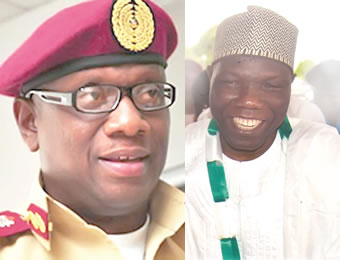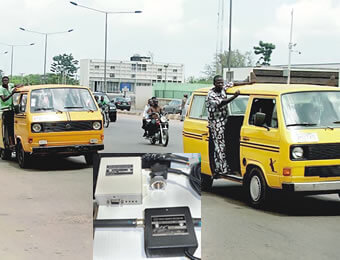As the Federal Road Safety Corps (FRSC) kicks off the enforcement drive of compulsory installation of the speed limit device starting with commercial vehicles, CLEMENT IDOKO and OLALEKAN OLABULO write that many commercial vehicle owners are yet to install the device.
YESTERDAY, October 1st, 2016, the Federal Road Safety Corps (FRSC) commenced what it tagged “Advisory Enforcement” of compulsory installation of speed limiting devices in commercial vehicles across the country. This came after several months of postponement.
This first phase of the enforcement drive, which is expected to last for three months, that is from now till 31st December, 2016, is still part of the ongoing sensitisation programme by the FRSC, in order to ensure that all commercial vehicle owners in the country fully and compulsorily comply with the directive.
Corps Marshal and Chief Executive of FRSC, Dr. Boboye Oyeyemi, insisted that the enforcement was in line with the approval by President Muhammadu Buhari, as part of government’s strategic efforts to reduce the high rate of accidents and deaths on the highways.
Speed limiting device or speed limiter for short, is a device used to limit the top speed of a vehicle by not allowing it to accelerate beyond the pre-set speed limit. It has been established that lower speed variance can be linked to fewer crashes and compliance with speed limits reduces the chances of vehicles getting involved in frequency of crashes and severity of bodily injuries.
Therefore, enforcing the use of speed limiter has become imperative considering the fact that speed itself has been identified as a key risk factor in road traffic injuries and mortality, influencing both the risk of a road crash as well as the severity of the injuries that result therefrom.
Oyeyemi explained recently that the planned implementation and enforcement of the speed governors had witnessed four postponements from its initial launching date of June 1, 2015, before its final approval by the Presidency. He noted that the “final directive from the presidency is clear; the enforcement date for the implementation of the speed limiting device is on October 1 and we have had series of stakeholders meeting.
“We already have the portal that we will use to monitor this. We don’t need to pursue any vehicle. We will just stop you like we verify licence. On the tablet we will check whether your vehicle has been installed with the device, if it has not, we will impound the vehicle and we make sure that you do the right thing.
“We are not talking about fines now; it’s to save lives so we will impound the vehicle then the owner of the vehicle will be made to install the device before the journey continues,” he said, adding that the corps would do this for the next three months to achieve enforcement and compliance so as to compel commercial vehicles to install the device,” he added.
It was revealed that about 68 per cent of the over 12,077 road crashes recorded in 2015, in which 5,400 people lost their lives, was traceable to high speed. Besides, stakeholders agree that aside safe motoring, chief among the benefits of using the electronic device is that it reduces fuel consumption resulting from lower speed. Regulated speed in turn cuts down the cost of maintenance, thus leading to longer life-span for vehicles.
FRSC Head, Media and Strategy, Mr Bisi Kazeem, explained that all the Sector Commands of the corps have commenced advisory enforcement of compulsory installation of speed limiting in commercial vehicles, noting that advisory enforcement was designed to further sensitise commercial vehicle owners to the need to install the device in their vehicles before the full-blown enforcement in January, 2017.
He corroborated the corps marhsall’s stand that no fine would be collected during the first phase of the enforcement ending by December 31, 2016.
Kazeem, further explained that free ticket booklets have been made available to all the Sector Commands across the Federation for booking of defaulters even though this would not attract any penalty but to force the motorists to go back and ensure that the right thing was done.

Sunday Tribune investigation, however, observed that while some major fleet operators have ensured compliance, not many commercial vehicle operators have complied, though the enforcement deadline started yesterday.
The Public Relations Officer of Peace Mass Transit Company, Abuja, Mr Jude Ngwu, said his organisation has ensured full compliance with the FRSC directive on their fleet. He added that the management of the company in its wisdom installed speed limiters in its vehicles to help reduce road crashes as a result of speeding by drivers.
According to him, the transport company had introduced installation of “speed governors” in its vehicles about six years ago. He, therefore, said the enforcement of by the FRSC did not pose any problems for the company.
He disclosed that from experience, the introduction of speed limiting devices has not only helped in reducing rate of road crashes involving the company’s vehicles but management cost has also been tremendously reduced. He disclosed that speed governors were installed in all his company’s over 3,000 buses plying the Nigerian highways.
Ngwu, noted that when a vehicle is involved in an accident, the loss is not only on the part of the passengers but is alsoborne by the company in terms of cost of repairing the vehicle, loss of personnel, and even the integrity of the company safety-wise, in the eyes of the public.
Managing Director of the Company, Mr Samuel Maduka Onjishi, also described the compulsory use of the limiter as the best thing to happen to transportation in the country.
However, an official of a Mass Transit Company located at Mararaba in Nsarawa State, an adjoining town to the Federal Capital Territory (FCT), who asked not be named said his organisation is yet to install the speed limiters in most of the vehicles, though he said the device is a good initiative in the effort to reduce high rate of road crashes in Nigeria.
He said the management of the company ensured that the device was installed in some of its new vehicles, adding that arrangement was in place to install the device in all the vehicles.
“You know that things are generally hard now in the country and I think the Road Safety people are aware of that. Gradually, we will get there.”
The Managing Director of ABC Transport Plc, Mr Frank Nneji, speaking recently at one of the stakeholders meetings on the implementation of the speed limiters condemned those who complain about the cost of installing the device in their vehicles, insisting that the benefits far outweigh other considerations.
Sunday Tribune recall that FRSC had stepped up sensitisation campaign to highlight the benefits to motorists and Nigeria at large of the speed limiting devices.
In Lagos State commuters, especially commercial vehicle operators, are anxiously awaiting the implementation of the speed limit device, this is just as the state sector of the FRSC has expressed its optimism that more commercial vehicle operators will comply before the expiration date.
But some drivers who spoke with the Sunday Tribune described the directive from the FRSC as another attempt to extort money from them and this might have been responsible for the low level of compliance among them, as over 90 per cent of them are yet to comply with the directive.
A commercial vehicle driver, who simply wants to be reffered to as Tunde and shuttles between Ikeja and Agege area of the state said: “I’ve heard about it (speed limiter). It can only work for private and personal vehicles, not for us commercial bus drivers.”
He continued: “They said they will start on Saturday (yesterday). We are waiting for them. The Lagos State government has come again. Will they install it in their BRT buses? I know they will not install it in the buses.”
When Sunday Tribune pointed out that the scheme was not an initiative of the Lagos State government, but that of the FRSC, Tunde said: “Don’t they want our vehicles on the road again? Or do they want our vehicles to be crawling on the road? The whole thing is all about making money out of us.”
Another driver, Taiwo, also said: “the fact is that I am aware, but many of our drivers are not aware. I am not sure of any single driver in the whole of our park here that has installed it in his vehicle.”
Taiye, as he is popularly called, also said that “we heard that the case is in court and our union has pleaded for more time. We are surprised that they still want to go ahead with the implementation.”
He, however, said “whatever happens on Saturday (yesterday) and afterwards will determine the level of compliance. I will wait and see what the road safety officials will do first, before deciding on what to do.”
The Lagos Sector Commander of the FRSC, Michael Olapade, while speaking with the Sunday Tribune expressed optimism that the drivers would comply, adding that some of the drivers had bought into the scheme.
“We are optimistic that they will comply. We don’t expect all of them to have complied by Saturday ((yesterday). Some of them have already installed it in their vehicles.”
“The vendors are doing their marketing and we expect more people to install it in their vehicles,” he said.
WATCH TOP VIDEOS FROM NIGERIAN TRIBUNE TV
- Relationship Hangout: Public vs Private Proposals – Which Truly Wins in Love?
- “No” Is a Complete Sentence: Why You Should Stop Feeling Guilty
- Relationship Hangout: Friendship Talk 2025 – How to Be a Good Friend & Big Questions on Friendship
- Police Overpower Armed Robbers in Ibadan After Fierce Struggle






